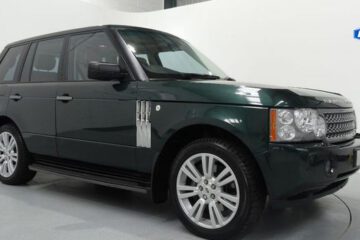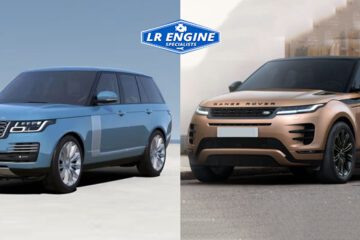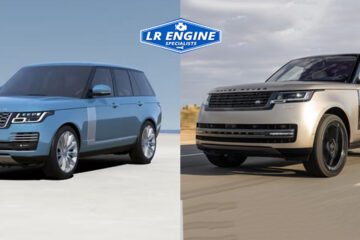For luxury SUV enthusiasts, the debate over the reliability of the Range Rover 3.0 vs. 4.4 engine is a burning issue, one that can make all the difference in the driving experience. Both engines offer power, refinement, and off-road capability, but longevity and reliability often determine the better option. Whether you’re looking for a Range Rover petrol engine or a Range Rover diesel engine, understanding how these two powertrains compare in durability is necessary.
This in-depth analysis will investigate the Range Rover 3.0L and 4.4L engine lifespan, reliability factors, maintenance demands, and real-world performance to discover which engine stands the test of time.
Range Rover 3.0 Engine vs Range Rover 4.4 Engine Reliability: A Detailed Comparison
Understanding the 3.0L and 4.4L Engine Variants
The Range Rover 3.0 engine is available in petrol and diesel versions, delivering an exemplary balance of power and efficiency. The 3.0L petrol engine generally features a supercharged V6 setup, offering effortless acceleration, while the diesel variant provides potent torque and fuel efficiency.
On the other hand, the Range Rover 4.4 engine is commonly found in diesel versions, particularly in high-performance models. It is a V8 powerhouse, well-known for its smooth power delivery and superior towing capability. Some older Range Rover petrol engine versions also had the 4.4L V8, but they were phased out in favor of smaller turbocharged units.
Reliability and Longevity: How Do They Compare?
Build Quality and Durability
One of the significant factors influencing Range Rover engine reliability is build quality. Although both the 3.0L and 4.4L engines are designed with high-performance materials, differences in design affect their longevity.
The Range Rover 3.0 engine is the latest, lightweight powertrain, designed with advanced cooling systems and turbocharging for maximum efficiency. However, turbocharged engines are often subject to higher thermal stress, which can result in component wear over time.
The Range Rover 4.4 engine, a V8 diesel, is built with a powerful crankshaft, reinforced block, and heavy-duty internals to withstand high torque loads. These design elements contribute to its incredible durability, making it a desirable choice for long-term use and heavy-duty applications.
Common Reliability Issues
While both engines are designed to Land Rover’s high standards, they are not without their problems.
>> The Range Rover 3.0 engine (petrol) can suffer from timing chain tensioner failures, leading to expensive repairs. Some diesel variants experience EGR valve clogging and turbocharger failures if not maintained properly.
>> The Range Rover 4.4 engine (diesel) is normally more robust, but early variants had issues with turbo actuator failures and oil leaks. Proper servicing helps mitigate these issues.
Service Life and Expected Mileage
A well-maintained Range Rover 3.0 engine generally lasts 150,000 to 200,000 miles, depending on driving habits and maintenance schedules. The petrol version may show signs of wear around 120,000 miles, whereas the diesel variant often lasts longer due to its lower RPM operation and potent internals.
The Range Rover 4.4 engine, especially the diesel variant, is known for surpassing 250,000 miles when properly maintained. This makes it the preferred choice for those wanting longevity and high-mileage performance.
Maintenance and Running Costs: Which One Is More Affordable?
Routine Maintenance and Service Intervals
Both engines want regular maintenance to achieve exemplary longevity. The Range Rover 3.0 engine has a more complex turbocharging system, requiring frequent oil changes and cooling system examinations. Failure to do so can cause turbo failure, carbon buildup, and oil sludge issues.
The Range Rover 4.4 engine benefits from a simpler but durable design, making it less sensitive to expensive failures. However, its larger displacement means higher oil and fuel consumption, resulting in increased running costs over time.
Cost of Repairs and Parts Availability
When it comes to repair expenses, the Range Rover 3.0 engine tends to be more costly, particularly in the petrol version. Superchargers and turbo units can be expensive to replace, and timing chain issues often need engine disassembly.
Well-known for its robustness, the Range Rover 4.4 engine experiences fewer issues and has a longer service life. The diesel variant, in particular, is famous for lower overall maintenance costs, though turbo replacements and injector repairs can be expensive.
Driving Experience and Performance Impact on Longevity
How Engine Usage Affects Durability
The way an engine is driven notably affects its lifespan.
The Range Rover 3.0 engine is perfect for urban commuting and occasional off-roading, but aggressive driving can result in early turbo wear and timing chain problems.
The Range Rover 4.4 engine shines in long-distance driving and towing, making it less susceptible to too much wear and overheating.
Fuel Efficiency and Its Role in Engine Wear
Fuel efficiency also plays a vital role in engine longevity. The 3.0L diesel version is impressively fuel-efficient, minimizing overall strain on the engine. In comparison, the 4.4L diesel consumes more fuel, but its low-stress operation at highway speeds improves its longevity.
Which Engine Should You Choose for Long-Term Ownership?
Best Choice for Reliability
If you prioritize reliability, the Range Rover 4.4 engine (diesel variant) is the best choice. It offers extraordinary durability, with many owners reporting over 250,000 miles of trouble-free use. The robust internals, better cooling, and high-torque performance make it a long-lasting powerhouse.
Best Choice for Cost-Effectiveness
The Range Rover 3.0 engine (diesel variant) is an exemplary choice for those looking for a balance between power, efficiency, and maintenance costs. It provides adequate longevity but needs more frequent servicing than the 4.4L diesel.
Best Choice for Urban and Highway Driving
For busy city driving, the 3.0L petrol engine offers better responsiveness and effortless acceleration. However, for highway cruising and off-road adventures, the 4.4L diesel engine remains the top choice.
Final Verdict:
After examining the Range Rover 3.0 engine vs the Range Rover 4.4 engine durability, the 4.4L diesel engine emerges as the longer-lasting and more reliable option. Its robust construction, lower RPM operation, and fewer complex components contribute to greater longevity compared to the 3.0L petrol and diesel versions.
For those who value long-term durability, fewer mechanical issues, and prolonged mileage, the Range Rover 4.4 diesel engine is the perfect investment. However, if you prefer a balance of power and efficiency with lower upfront expenses, the 3.0L diesel engine is a worthy competitor.
LR Engine Specialists offers expert solutions for Range Rover engine repairs, replacements, and maintenance, your reliable partner for quality service.
Conclusion:
When comparing the Range Rover 3.0 Engine vs Range Rover 5.0 Engine acceleration, the 5.0L supercharged V8 delivers quick pickup and stronger performance. The 3.0L turbocharged inline-six has a refined balance of speed and efficiency, making it a workable choice for daily driving. Meanwhile, the 5.0L V8 dominates acceleration, throttle response, and raw power, making it the ideal choice for enthusiasts. For specialist advice on Range Rover engine upgrades, repairs, and replacements, visit LR Engine Specialists, your trusted source for ideal Land Rover performance solutions.
FAQs:
Which Range Rover engine lasts longer, the 3.0L or 4.4L?
The 4.4L diesel engine normally lasts longer, often exceeding 250,000 miles with meticulous maintenance.
What are the most common issues with the 3.0L engine?
The 3.0L petrol can face timing chain failures, while the diesel version may experience turbocharger and EGR issues.
Is the 4.4L engine more expensive to maintain than the 3.0L?
The 4.4L has higher fuel and oil consumption, but it normally requires fewer expensive repairs than the 3.0L petrol.
Which engine is better for city driving, the 3.0L or 4.4L?
The 3.0L petrol is better for city driving due to its immediate response, while the 4.4L diesel excels in long-distance cruising.
How can I extend the lifespan of my Range Rover engine?
Routine maintenance, timely oil changes, and proper cooling system care are vital to maximizing engine longevity.


